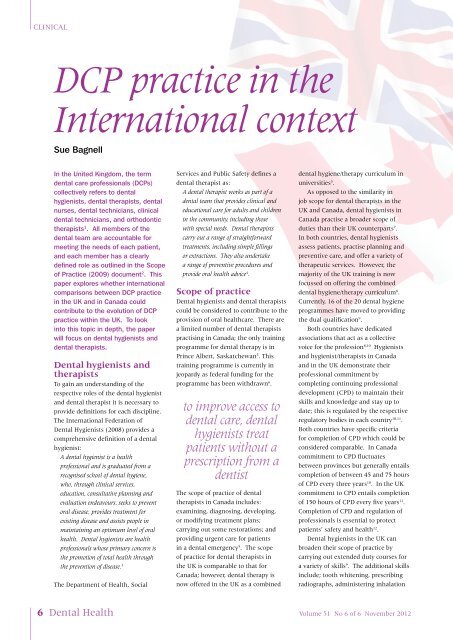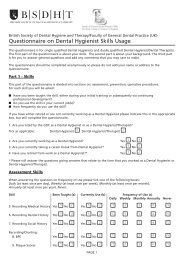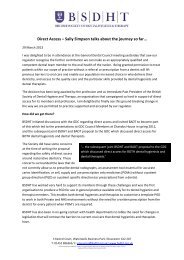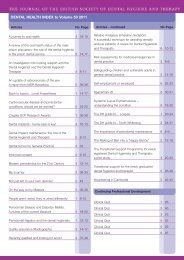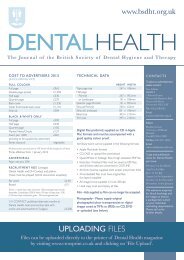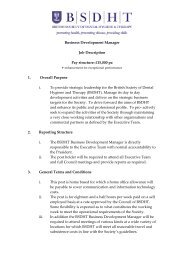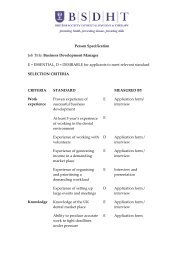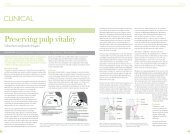Dental Health - British Society of Dental Hygiene & Therapy
Dental Health - British Society of Dental Hygiene & Therapy
Dental Health - British Society of Dental Hygiene & Therapy
- No tags were found...
You also want an ePaper? Increase the reach of your titles
YUMPU automatically turns print PDFs into web optimized ePapers that Google loves.
clinicalDCP practice in theInternational contextSue BagnellIn the United Kingdom, the termdental care pr<strong>of</strong>essionals (DCPs)collectively refers to dentalhygienists, dental therapists, dentalnurses, dental technicians, clinicaldental technicians, and orthodontictherapists 1 . All members <strong>of</strong> thedental team are accountable formeeting the needs <strong>of</strong> each patient,and each member has a clearlydefined role as outlined in the Scope<strong>of</strong> Practice (2009) document 2 . Thispaper explores whether internationalcomparisons between DCP practicein the UK and in Canada couldcontribute to the evolution <strong>of</strong> DCPpractice within the UK. To lookinto this topic in depth, the paperwill focus on dental hygienists anddental therapists.<strong>Dental</strong> hygienists andtherapistsTo gain an understanding <strong>of</strong> therespective roles <strong>of</strong> the dental hygienistand dental therapist it is necessary toprovide definitions for each discipline.The International Federation <strong>of</strong><strong>Dental</strong> Hygienists (2008) provides acomprehensive definition <strong>of</strong> a dentalhygienist:A dental hygienist is a healthpr<strong>of</strong>essional and is graduated from arecognised school <strong>of</strong> dental hygiene,who, through clinical services,education, consultative planning andevaluation endeavours, seeks to preventoral disease, provides treatment forexisting disease and assists people inmaintaining an optimum level <strong>of</strong> oralhealth. <strong>Dental</strong> hygienists are healthpr<strong>of</strong>essionals whose primary concern isthe promotion <strong>of</strong> total health throughthe prevention <strong>of</strong> disease. 3The Department <strong>of</strong> <strong>Health</strong>, SocialServices and Public Safety defines adental therapist as:A dental therapist works as part <strong>of</strong> adental team that provides clinical andeducational care for adults and childrenin the community, including thosewith special needs. <strong>Dental</strong> therapistscarry out a range <strong>of</strong> straightforwardtreatments, including simple fillingsor extractions. They also undertakea range <strong>of</strong> preventive procedures andprovide oral health advice 4 .Scope <strong>of</strong> practice<strong>Dental</strong> hygienists and dental therapistscould be considered to contribute to theprovision <strong>of</strong> oral healthcare. There area limited number <strong>of</strong> dental therapistspractising in Canada; the only trainingprogramme for dental therapy is inPrince Albert, Saskatchewan 5 . Thistraining programme is currently injeopardy as federal funding for theprogramme has been withdrawn 6 .to improve access todental care, dentalhygienists treatpatients without aprescription from adentistThe scope <strong>of</strong> practice <strong>of</strong> dentaltherapists in Canada includes:examining, diagnosing, developing,or modifying treatment plans;carrying out some restorations; andproviding urgent care for patientsin a dental emergency 5 . The scope<strong>of</strong> practice for dental therapists inthe UK is comparable to that forCanada; however, dental therapy isnow <strong>of</strong>fered in the UK as a combineddental hygiene/therapy curriculum inuniversities 5 .As opposed to the similarity injob scope for dental therapists in theUK and Canada, dental hygienists inCanada practise a broader scope <strong>of</strong>duties than their UK counterparts 7 .In both countries, dental hygienistsassess patients, practise planning andpreventive care, and <strong>of</strong>fer a variety <strong>of</strong>therapeutic services. However, themajority <strong>of</strong> the UK training is nowfocussed on <strong>of</strong>fering the combineddental hygiene/therapy curriculum 8 .Currently, 16 <strong>of</strong> the 20 dental hygieneprogrammes have moved to providingthe dual qualification 9 .Both countries have dedicatedassociations that act as a collectivevoice for the pr<strong>of</strong>ession 8,10 Hygienistsand hygienist/therapists in Canadaand in the UK demonstrate theirpr<strong>of</strong>essional commitment bycompleting continuing pr<strong>of</strong>essionaldevelopment (CPD) to maintain theirskills and knowledge and stay up todate; this is regulated by the respectiveregulatory bodies in each country 10,11 .Both countries have specific criteriafor completion <strong>of</strong> CPD which could beconsidered comparable. In Canadacommitment to CPD fluctuatesbetween provinces but generally entailscompletion <strong>of</strong> between 45 and 75 hours<strong>of</strong> CPD every three years 10 . In the UKcommitment to CPD entails completion<strong>of</strong> 150 hours <strong>of</strong> CPD every five years 11 .Completion <strong>of</strong> CPD and regulation <strong>of</strong>pr<strong>of</strong>essionals is essential to protectpatients’ safety and health 12 .<strong>Dental</strong> hygienists in the UK canbroaden their scope <strong>of</strong> practice bycarrying out extended duty courses fora variety <strong>of</strong> skills 9 . The additional skillsinclude; tooth whitening, prescribingradiographs, administering inhalation6 <strong>Dental</strong> <strong>Health</strong> Volume 51 No 6 <strong>of</strong> 6 November 2012


